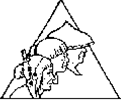INQUIRER MINDANAO
PDI 02 Aug 2006
http://newsinfo.inq7.net/inquirerheadlines/regions/view_article.php?article_id=12499
By Julie AlipalaInquirerLast updated 04:57am (Mla time) 07/30/2006
Published on page A15 of the July 30, 2006 issue of the Philippine Daily Inquirer
RAIN is like gold here. “If there’s no rain, we will have no money, we will have no food,” said Musa Mohammad, the maintenance officer of the rainwater catchment program in Tictabon Island.
The catchment is one of the three major projects introduced by the Alliance for Mindanao Off-Grid Renewable Energy Program or Amore in 2004 after organizing the community into the Tictabon Barangay Renewable Energy and Community Development Association (Tibrecda).
Amore poured in about P200,000 for the construction of the communal rain water catchment in February 2005.
The island experiences rain at least once a month that hardly fills the 14,000-liter capacity rainwater tank.
“The most we can get is 400 liters, which is not enough for the more than a thousand households,” said Baki Tibrecda treasurer Abdurahim, 62.
Each member of a family requires 30 liters of water a day, “but with about 400 liters, it poses a huge problem for the community,” Abdurahim said.
But villagers do not run out of ideas to get clean and safe water.
Barangay chair Wahid Musa said the community, which is about an hour-long boat ride to the city’s mainland, is dependent on water peddled by nearby island barangays.
“Water is really scarce here. Each 20-liter container costs us P5 and another P3 for the fare, that’s about P8 per container,” Musa said.
In February this year, members and officers of Tibrecda went through a formal Water Disinfection Training led by the Department of Health for Western Mindanao.
A tablespoon of solution is mixed to a 20-liter container water.
Musa said priority is given to the poorest members of the community for the water gathered from their rain water catchment.
The group even demonstrated their new found knowledge with National Anti-Poverty Commission Secretary Zamzamin Ampatuan.
“I am very impressed, even the most ordinary and not fully educated fishermen and farmers could now produce safe water for their own people,” Ampatuan said.
Maria Theresa Capelan, head of Amore Philippines, along with USAID Senior Technical Adviser Rosario Calderon, expressed satisfaction on the transformation of Tictabon.
Capelan said two years ago, Tictabon did not have water and light “and the people were disorganized.”
Two years ago, just about 500 households, mostly belonging to the Samah Bangingi tribe, lived on the island. The community now has 1,200 households, comprising of Yakan, Samah and Tausugs.
Tictabon is also now well lit after getting the 55-watt solar home systems in 2004 and two units of 75-watt street lights last year.
“Now we highly appreciate the rain and the sun. When it rains, we have water. And the sun provides us electricity,” Abdurahim said.
Wednesday, August 02, 2006
Subscribe to:
Post Comments (Atom)

No comments:
Post a Comment